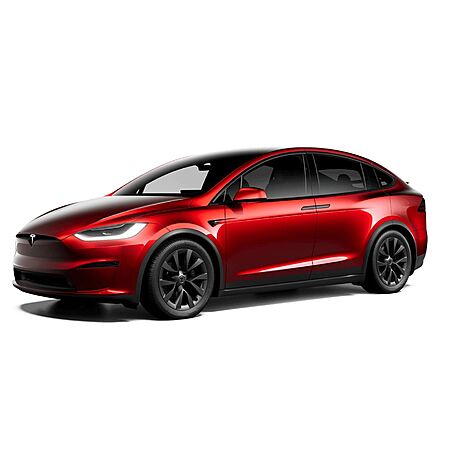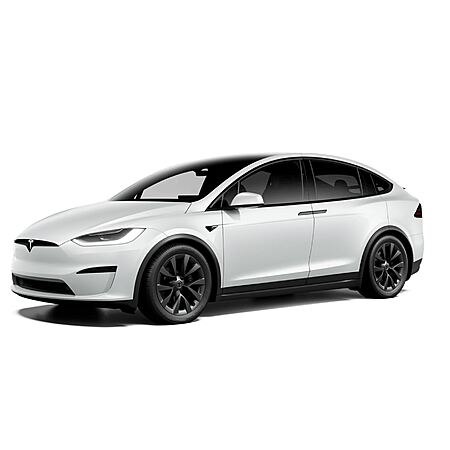Save another $1,000 by using your friends referral link when buying a Tesla.
This post can be edited by most users to provide up-to-date information about developments of this thread based on user responses, and user findings. Feel free to add, change or remove information shown here as it becomes available. This includes new coupons, rebates, ideas, thread summary, and similar items.
Once a Thread Wiki is added to a thread, "Create Wiki" button will disappear. If you would like to learn more about Thread Wiki feature, click here.
popularBigShotBob posted Sep 01, 2023 06:36 AM
Item 1 of 2
Item 1 of 2
popularBigShotBob posted Sep 01, 2023 06:36 AM
Tesla Model X & Model S Price Cut
$79,990
$79,990
Good Deal
Bad Deal
Save
Share


Leave a Comment
1,203 Comments
Sign up for a Slickdeals account to remove this ad.
You're more likely to lose less by waiting for the price to *increase once* and buy than buy while the prices are still falling every other month. At least then you know it's over. This matters because the resale value of your eventual purchase is strongly linked to new-model pricing.
Example: it falls $2000, then $2000 again, and then goes up $1,000. You're "down" $1k instead of $3k.
That was under the original federal rebate program that expired, not under the current Inflation Reduction Act program, but I don't think there's any difference in terms of any limits on how many you can claim in one year, or over multiple years, as long as you have the tax liability for that year
That was under the original federal rebate program that expired, not under the current Inflation Reduction Act program, but I don't think there's any difference in terms of any limits on how many you can claim in one year, or over multiple years, as long as you have the tax liability for that year
Thanks a lot.
..with which you can then replace the car the accident destroyed since they pay you out what it'd cost to replace it. That's kind of the point.
Sign up for a Slickdeals account to remove this ad.
Especially with an EV, where they're SO many fewer wear parts, or ways to abuse the vehicle that impacts long-term longevity.... like with a gas car excessive idling, or improper gear shifting, or simply not changing engine fluids often enough, or many other things, can all cause hidden until long term damage.
None of those concerns exist with an EV.
Also, if even if you can buy the same car for the price the insurance company paid your bank, you would have new financing at 2023 interest rates.
Especially with an EV, where they're SO many fewer wear parts, or ways to abuse the vehicle that impacts long-term longevity.... like with a gas car excessive idling, or improper gear shifting, or simply not changing engine fluids often enough, or many other things, can all cause hidden until long term damage.
None of those concerns exist with an EV.
1. If you get into a car accident and it is totaled, the insurance will only give you a check for the replacement value. Since there was a drastic price drop, and if you didn't have GAP insurance, you are responsible for that cost difference.
Example: Bought Model X at $110k last year, financed it at $100k with 10% downpayment, but just got into an accident, but the cost of a depreciated Model X that was in the accident is now only $60k. Insurance pays you only $60k, but you owe about $85k on the vehicle still. You have to pay that $25k immediately back to the bank without GAP insurance. Insurance now owns the car because they 'bought it from you,' but you still have to pay your own loan off.
If the car's price didn't drop, then the used car values would have been higher by about $20k, making you only have to pay $5k of the difference.
You can make the argument that you're still getting the same car, but money wise, that's a big potential burden for you.
2. Tesla's are not known for their good QC, even with new. Many people have problems even with their new Teslas. The used Tesla market now could potentially be problematic due to owners that are dumping their Teslas due to QC issues, etc. Plus, it is not in anyone's best interest to sell or trade in their Model X now, as they would incur a hugely depreciated value, so the chances of buying a used Tesla with no problems is even less. It was a good time to sell the Tesla last year, given inflated values, but really bad time to sell now.
3. Lastly, some people don't want to hold onto their cars for a long time, especially EVs since their batteries degrade over time, and want to trade it in for a different vehicle. This price drop has made it harder for people to trade in a Tesla Model X without incurring a huge drop in value.
"Avoiding the costs of an ordinary oil change is enough for the majority of individuals to purchase a Tesla. However, there's a probability that the typical Tesla hardware repair cost will exceed the money you save on standard vehicle maintenance. Tesla repair expenses, according to RepairPal, are 27 percent higher than those for comparable gas-powered vehicles. According to the same report, the average annual repair cost for a Tesla vehicle is estimated to be $832, compared to $652 for a vehicle on average."
https://www.msn.com/en-us/autos/n...21#image=1
"The high cost of a Tesla doesn't stop at its price tag. Insurance for a Tesla tends to be significantly more expensive than that of other popular vehicles, despite its high safety ratings."
https://www.nerdwallet.
1. If you get into a car accident and it is totaled, the insurance will only give you a check for the replacement value. Since there was a drastic price drop, and if you didn't have GAP insurance, you are responsible for that cost difference.
Why would you buy a $110,000 car with so little down and NOT have gap insurance which costs pennies on the price?
Tesla consistently ranks at the top of the industry for owner satisfaction-- people are generally not satisifed if products have serious QC issues.
Most of the non-anecdotal evidence anyone can ever give here in the negative is stuff like Consumer Reports reader surveys where it's largely old people who still subscribe to a paper magazine being confused by a modern infotainment system--- not anything actually wrong with the reliability of the vehicle.
Actual real world fleet data shows you retain roughly 90% of your battery life in a Tesla after 200,000 miles.
Plus if you have an older S/X you've got 8 years unlimited miles of warranty on it anyway.
Double funny in that you JUST told us people ARE going to hang onto older ones longer, and now tell us....literally the opposite.
Quick shout out for the one actual valid point in this discussion about why losing an existing vehicle for a new one would be financially bad.
That said- it would be more bad if the price cuts had not happened.
Because your point of needing a new loan is true regardless of price
And with the lower price now you'd have a smaller new loan
For example let's say you paid 110k for a base X during the high prices, you put 10k down, 100k loan for 5 years. Since you're not financially illiterate you got GAP insurance. You're 6 months in and it gets totaled. You've got roughly 90 left on your loan.
A new one is now $79,990... your insurance pays you out $79,990 (because decent insurance does full replacement value at least the first year or two). Your gap insurance covers the other ~10k.
You now get to buy a new one for $79,990 and get a $7500 tax credit. So 72.5k net cost to you you now owe on a new loan.
Versus the 90k you owed on a 6 month older one before the accident.
Seems pretty ok to me even if your interest rate on the 72.5k is a little higher.
If there had NOT been a price cut you'd owe the higher interest on a new -110k- loan AND get no tax credit.
That's fundamentally worse
https://www.hotcars.com/real-trut...liabilit
In the current long-term reliability study, however, which stretches to three full years of ownership, Tesla cars in aggregate would've occupied 28th out 32 places in total with 242 issues per one hundred vehicles reported in the period. Compare this to the 133 issues found with Lexus - the top performer - or the 144 of Hyundai's premium brand Genesis. Tesla doesn't even size up with the industry average of 186 reported problems and is somewhere towards the tail end of the ranking among slackers like Ford.
https://www.notebookche
Tesla was found to be one of the most unreliable brands in America, according to Consumer Reports' annual reliability report.
Consumer Reports' annual reliability rankings have been released, and with data from 24 brands and over 300,000 vehicles, Tesla fell near the bottom (19/24) along with Mercedes-Benz, Jeep, Volkswagen, GMC, and Chevrolet.
https://www.teslarati.c
Common complaints from Model Y owners included:
Faulty sensors that required replacement
Troubles with heat pumps
Air conditioning
Body panels that didn't line up
Water leaks in the trunk because of missing seals
Water leaks through the window seals
Heating system
Display screen freezing or going blank
Body control module failure
Gauges blacked out while driving
https://www.msn.com/en-us/autos/n...21#image=1
Sign up for a Slickdeals account to remove this ad.
https://www.hotcars.com/real-trut...liabilit
In the current long-term reliability study, however, which stretches to three full years of ownership, Tesla cars in aggregate would've occupied 28th out 32 places in total with 242 issues per one hundred vehicles reported in the period. Compare this to the 133 issues found with Lexus - the top performer - or the 144 of Hyundai's premium brand Genesis. Tesla doesn't even size up with the industry average of 186 reported problems and is somewhere towards the tail end of the ranking among slackers like Ford.
https://www.notebookche
Tesla was found to be one of the most unreliable brands in America, according to Consumer Reports' annual reliability report.
Consumer Reports' annual reliability rankings have been released, and with data from 24 brands and over 300,000 vehicles, Tesla fell near the bottom (19/24) along with Mercedes-Benz, Jeep, Volkswagen, GMC, and Chevrolet.
https://www.teslarati.c
Common complaints from Model Y owners included:
Faulty sensors that required replacement
Troubles with heat pumps
Air conditioning
Body panels that didn't line up
Water leaks in the trunk because of missing seals
Water leaks through the window seals
Heating system
Display screen freezing or going blank
Body control module failure
Gauges blacked out while driving
https://www.msn.com/en-us/autos/n...21#image=1
Leave a Comment